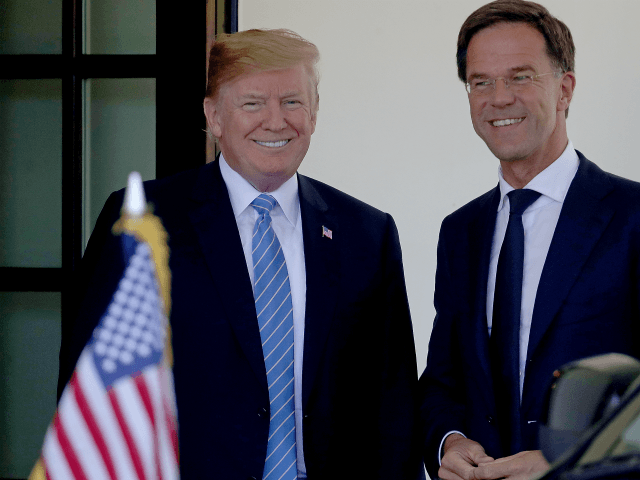President Trump sat down with Dutch Prime Minister Mark Rutte Monday and demanded fair treatment by the World Trade Organization (WTO) on behalf of the American people, calling out the European Union (EU) for hypocrisy.
Trump noted that the EU’s 10-percent automobile tariffs are more than four times higher than the United States’. The EU exported 37.4 billion euros worth of cars to the United States in 2017, while the U.S. only shipped 6.2 billion euros worth to Europe.
Meanwhile, European Union leaders sent the U.S. Commerce Department an 11-page warning Friday, insisting that President Trump’s tariffs on steel and aluminum will “undermine U.S. growth.”
In June, Trump imposed protective tariffs on imports from Mexico, Canada, and Europe, stipulating 25 percent tariffs on imported steel and 10 percent aluminum tariffs in order to facilitate “fair trade deals for our taxpayers.” Despite a barrage of criticism, Trump has appeared unmoved in his resolve.
Friday’s warning letter accompanies retaliatory EU tariffs, worth 2.5 billion pounds, imposed on American-made jeans and Harley Davidson motorcycles. Trump responded to these new tariffs by pointing out that European automobile manufacturers ship luxury vehicles—like Mercedes-Benz automobiles—into the United States while American models are not accepted in Europe.
Stepping up the game, Trump then threatened to impose a 20 percent tariff on European car imports to the U.S. while the EU attempted to deflect attention from the apparent trade imbalance by suggesting that China is the real threat to worldwide trade.
In a Fox News appearance over the weekend, Trump said that “the European Union is possibly as bad as China, only smaller.” The EU then warned of $294 billion worth of counter-tariffs to be imposed on American goods being shipped to Europe for consumption.
This back-and-forth between Trump and the leaders of the EU has stoked fears of a trade war. If such a battle were to come into fruition, some estimate that global growth could suffer a 1.4 percent decrease over the next two years, though such hypotheses are highly speculative.
On the other hand, China imposed $35 billion worth of tariffs on U.S. goods in response to Trump’s attempt at leveling the playing field between American and Chinese suppliers.
Trump’s efforts to ease the financial burden on American producers have placed him in the midst of yet another controversy, one he seems to relish. His art-of-the-deal style, hard bargaining may not please those unused to such tactics, but so far the results do not suggest he is mistaken.
Follow Thomas D. Williams on Twitter Follow @tdwilliamsrome

COMMENTS
Please let us know if you're having issues with commenting.